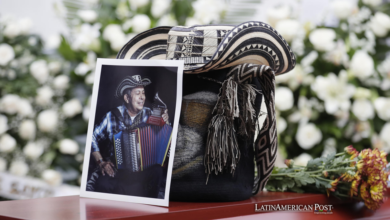In the lead-up to the upcoming elections in Colombia, the nation is witnessing a grim and alarming trend – political violence. At least seven candidates have fallen victim to targeted assassinations during the campaign, raising significant concerns about the state of democracy in the country. Against this backdrop of electoral violence, Colombia finds itself at a critical juncture where the very essence of democratic processes is under threat.

Photo: 10/25/2023. Colombia’s Attorney General, Francisco Barbosa, gives a press conference today in Bogota (Colombia). EFE/ Mauricio Dueñas Castañeda
The Latin American Post Staff
Escucha este artículo
Leer en español: La violencia electoral en Colombia: una amenaza a la democracia
Unprecedented Violence Shakes Colombian Elections
The shocking revelation of seven assassinations and seven attempted murders of political candidates has cast a dark shadow over the Colombian electoral landscape. These acts of violence, primarily directed at candidates for local positions such as city councils, regional legislators, and local administrative boards, are not isolated incidents. Instead, they represent a disturbing pattern of violence that threatens the integrity of Colombia's democratic institutions.
These acts of brutality have unfolded in various locations across the country, including Taminango, Guachené, Pradera, and Jamundí in the southwest, as well as in Honda near Bogotá, Mutatá in Antioquia, and Cartagena de Indias. These heinous crimes have cut across political affiliations, affecting candidates from the Partido Liberal, the official coalition Pacto Histórico, and the parties Alianza Verde, Gente en Movimiento, Cambio Radical, and Creemos.
Demanding Accountability and Justice
The individuals behind these crimes must be held accountable, and the authorities have begun investigating these cases. The prosecutor general, Francisco Barbosa, revealed that they had received a staggering 531 reports of threats against candidates in the lead-up to the elections. It is essential to underscore that the violence and threats go beyond a mere security concern; they are an affront to the very principles of democracy.
Electoral violence in Colombia is not a new phenomenon, but the scale and severity of the current situation are deeply concerning. It reflects a broader trend of political violence that threatens the foundations of democracy. The impact of these incidents goes beyond the immediate victims and their families; it erodes trust in democratic processes, undermines the credibility of elections, and discourages individuals from participating in politics.
The Electoral Risk Map: A Sobering Reality
The "Mapa de Riesgo Electoral" (Electoral Risk Map), designed by the authorities, highlights the gravity of the situation. It categorizes 261 municipalities as being at high risk of electoral-related violence, with an additional 494 towns at medium risk. In essence, over half of the nation faces a real threat to the integrity of the electoral process.
It is imperative to recognize that these acts of violence not only stifle the voices of those running for office but also hinder the representation of marginalized communities. Candidates who advocate for positive change and champion the rights of their constituents are silenced through these reprehensible acts. The impact is far-reaching, extending to the very heart of Colombia's democracy.
The Colombian authorities have responded with investigations, acknowledging the gravity of the situation. The prosecutor general's office has opened 1,519 cases, underscoring their commitment to ensuring that justice prevails and that the electoral process remains transparent. With a dedicated team of 5,700 officials deployed across the nation to oversee the elections, their resolve is evident.
Also read: Elections in Colombia 2023: the Disorder of Petrism vs the Inexperience of Duquism
Challenges in Upholding Democracy
The police have also played a crucial role in addressing electoral concerns, responding to 211 reports of potential electoral crimes. These reports cover a range of issues, including alleged voter registration fraud, voter intimidation, and corruption of the electoral process. While the police's swift response is commendable, it is a stark reminder of the challenges that Colombia faces in upholding the democratic process.
As Colombia prepares for the upcoming elections, it confronts an urgent challenge – to protect the democratic principles that underpin the nation's governance. The international community, too, must remain vigilant, offering support and assistance to safeguard the integrity of Colombia's electoral process.
Colombia's journey towards a more inclusive and representative democracy faces formidable hurdles. However, the resilience of its people and the commitment of its authorities to investigate and address electoral violence offer a glimmer of hope. The outcome of these elections will not just determine the future leaders of Colombia; it will also signify the strength and resolve of a nation to uphold democratic values in the face of adversity.
Democracy's Fragility and the Call for Justice
The country's struggle with electoral violence is a stark reminder that democracy is a fragile construct, requiring constant vigilance and protection. The heinous acts against political candidates must be condemned, and justice must be served. The nation's journey towards a more equitable and just society hinges on the ability to conduct elections that are free from fear, violence, and intimidation.
The nation's democratic spirit must prevail over the shadow of violence. The nation's people, its institutions, and the international community must unite to ensure that the democratic process is upheld, candidates are protected, and the voices of the marginalized are heard. The upcoming elections present an opportunity for Colombia to prove that democracy can triumph over adversity, securing a brighter and more inclusive future for all its citizens.




